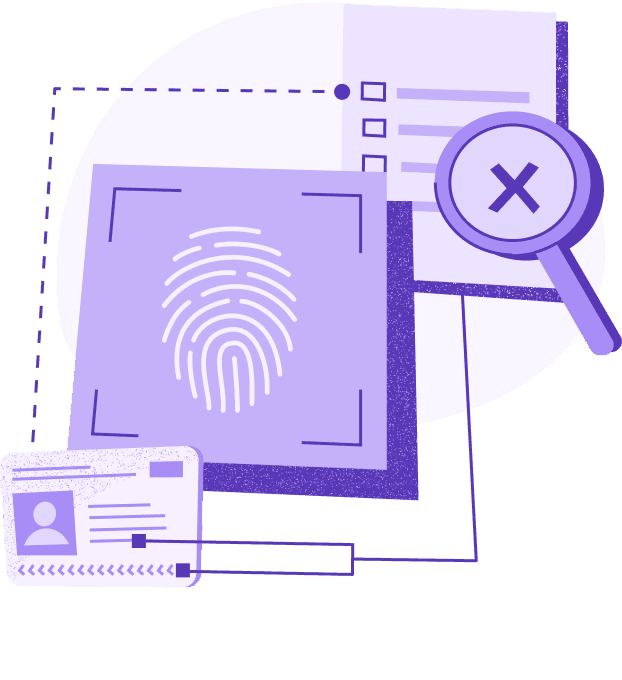Article
5 min read
A Guide to Employee Background Checks in Turkey
Employee background checks
Legal & compliance

Author
Michał Kowalewski
Last Update
September 05, 2025

Table of Contents
Essential information for a background check in Turkey
Are background checks legal in Turkey?
What types of background checks are illegal in Turkey?
Common background check industries in Turkey
Types of background checks in Turkey
Background check mistakes to avoid in Turkey
Step-by-step guide to employee background checks in Turkey
Run employee background checks with Deel
Key takeaways
- Background checks are legal in Turkey, but compliance with data protection laws is crucial. Obtain consent, gather relevant information, and ensure data security.
- Common check types include criminal records, employment history, and education verification. Avoid gathering irrelevant information or discriminating based on protected characteristics.
- Background checks are prevalent in sectors like finance, healthcare, education, and transportation, where expertise and credentials are particularly important.
Employee background checks should be an integral part of your hiring process in Turkey. Although not mandatory, they are a common practice, especially in finance, healthcare, education, transportation, logistics, government and public sector.
Turkiye boasts impressive GDP growth and a thriving IT sector with over 1.2 million professionals. Competitive labor costs, particularly in major hubs like Istanbul, make it an attractive option for tech companies. Additionally, government initiatives and vocational training programs actively contribute to a skilled talent pool.
By understanding Turkey's advantages and prioritizing responsible recruitment strategies, including an effective screening process, global companies can tap into this promising tech market and secure talented and skilled workers.
In this article, you will discover:
- How to run an effective and legal employment screening in Turkey
- What are the common types of employee checks in Turkey
- Step-by-step process of a thorough employee screening
- What mistakes to avoid when performing a background check in Turkey
Essential information for a background check in Turkey
An employee background check is the process of verifying a potential hire’s work history, education, professional qualifications, and any criminal records they might have. It’s particularly beneficial to run before finalizing an employment offer or signing a contract, ensuring the candidate meets the company's standards and requirements.
In Turkey employee background checks are governed by the Turkish Personal Data Protection Law (PDPL) and Personal Data Protection Authority (KVKK), which is responsible for enforcing the PDPL.
-
Turkish Personal Data Protection Law (PDPL): This law, inspired by the European Union's General Data Protection Regulation (GDPR), governs the collection, processing, and storage of personal data. While not fully compliant with all aspects of the GDPR, the PDPL shares similar principles, prioritizing individual privacy rights.
-
Personal Data Protection Authority (KVKK): The key organization overseeing data protection in Turkey is the Personal Data Protection Authority (KVKK). This regulatory body is responsible for enforcing data protection laws, handling complaints, and providing guidance on best practices for data processing and privacy.
While the PDPL doesn't have specific regulations solely focused on background checks, the general principles it outlines, such as transparency, purpose limitation, and data minimization, must be followed during these processes.
Are background checks legal in Turkey?
Background checks are legal in Turkey, provided that they comply with the regulations outlined in the Personal Data Protection Law.
Employers can conduct background checks on potential employees, but they must obtain the candidate's explicit consent before initiating the process. Although it’s not specified in the law, written consent is recommended for documentation and compliance purposes.
Additionally, the information gathered through background checks must be relevant to the position for which the individual is being considered. Employers are also obligated to handle and store the collected data in a secure manner to prevent unauthorized access or misuse.
What types of background checks are illegal in Turkey?
In Turkey, certain types of background checks are considered illegal or restricted due to privacy and data protection laws. While specific laws regarding background checks may not be as clearly defined as in countries like the US or members of the EU, Turkey's adherence to international standards and its own regulations necessitates careful consideration of what is permissible.
Stay clear of:
- Biometric data without consent: Fingerprints, iris scans, and similar require explicit written permission from the candidate
- Unauthorized information access: Hacking, buying data from third parties, or exceeding authorized checks are strictly prohibited
- Gathering of protected information: Gathering information about a candidate's religious or political affiliations, ethnic background, or health status is strictly forbidden, as it infringes upon the individual's privacy rights
- Disregarding data security measures: Failing to implement appropriate security measures to protect collected data from unauthorized access, loss, or misuse is against the law
Violations of the Personal Data Protection Law can result in significant penalties. In 2020, the Turkish Personal Data Protection Authority imposed fines totaling 6.870.500,00 ₺ for various infringements, such as breaches of data security obligations and failure to comply with the Board's decisions. Penalties ranged from fines to imprisonment, depending on the nature of the violation, highlighting the importance of strict adherence to data protection regulations to avoid legal and financial repercussions.
Common background check industries in Turkey
In Turkey, various industries rely on employee background checks to make informed hiring decisions and mitigate potential risks. Some of the common industries where background checks are prevalent include:
- Financial services: Banks, insurance companies, and financial institutions prioritize background checks to assess the integrity and trustworthiness of employees handling sensitive financial transactions and client data
- Healthcare: Hospitals, clinics, and healthcare facilities conduct thorough background checks to ensure the qualifications and credentials of medical professionals, safeguarding patient safety and well-being
- Education: Schools, universities, and educational institutions prioritize background checks for faculty and staff to create a secure environment for students and uphold the standards of academic integrity
- Transportation and logistics: Companies in the transportation and logistics sector emphasize background checks to verify the driving records, criminal history, and regulatory compliance of employees involved in driving and operating vehicles
- Government and public sector: Public sector organizations and government agencies conduct comprehensive background checks to uphold the standards of integrity and security in public service roles
Background checks
Types of background checks in Turkey
Effective employment screening in Turkey covers essential aspects to evaluate a candidate's abilities. Knowing these areas helps employers tailor screening processes to meet job requirements and legal standards.
| Type of Check | Common in Turkey | Reason |
|---|---|---|
| Criminal Record Check | Common | Screening for past criminal convictions relevant to the job role is a common practice to ensure workplace safety and security |
| Employment History | Common | Important for assessing the candidate's work experience, performance, and integrity |
| Education Verification | Common | Ensures the candidate possesses the required education and skills for the role |
| Credit History Check | Less common | Assessing the candidate's financial integrity through credit history is less common, primarily used in financial services and certain specialized roles where financial responsibility is critical |
| Reference Check | Common | Provides insights into the candidate's character and work ethic through past colleagues or supervisors |
| Social Media Screening | Less common | While gaining popularity, social media screening is still less common due to privacy considerations, especially in industries where the relevance of personal online activities to job performance is less apparent |
Background check mistakes to avoid in Turkey
Whether you’re hiring employees or contractors in Turkey, there are a few things you shouldn’t do as an employer when it comes to background checks:
- Violating data protection laws: Failing to obtain consent or mishandling personal data can lead to legal consequences and damage the employer's reputation
- Collecting irrelevant information: Gathering excessive or irrelevant personal information beyond the scope of the job position violates privacy laws and can result in legal repercussions
- Mishandling of personal data: Failing to secure and protect the personal data collected during background checks can lead to data breaches and legal penalties
- Discriminatory practices: Engaging in discriminatory practices, such as requesting information about the candidate's religious beliefs or health status, is illegal and unethical
- Incomplete verification: Skipping crucial verification steps, such as educational qualifications or employment history, can result in hiring unqualified or dishonest candidates
Step-by-step guide to employee background checks in Turkey
- Obtain candidate consent: Before initiating a background check, employers must obtain explicit consent from the candidate, clearly outlining the purpose and scope of the investigation
- Verify identity and credentials: Confirm the candidate's identity, educational qualifications, and professional certifications through official documents and reputable sources
- Verify professional qualifications: Verify the candidate's educational and professional credentials through official channels, such as universities and professional associations
- Verify employment history: Contact previous employers to validate the candidate's work experience, job responsibilities, and reasons for leaving
- Check criminal record: Conduct a criminal record check through the Turkish law enforcement authorities to identify any past criminal convictions relevant to the job role.
- Check references: Reach out to professional references provided by the candidate to gain insights into their work ethic, skills, and character
- Check credit history: Assess the candidate's financial integrity by verifying their credit history and financial records, ensuring compliance with relevant laws and obtaining the candidate's consent
- Check social media: Conduct a responsible review of the candidate's public social media profiles, ensuring that the information gathered is relevant to the job and does not infringe upon their privacy rights
- Document the process: Maintain detailed records of the background check process, including consent forms, communication with third parties, and the information gathered
- Inform the candidate: Upon completion of the background check, employers should transparently communicate the results to the candidate and provide an opportunity for them to address any discrepancies or concerns
You can also automate this process using Deel, and get a fast employee background check, with results coming in a matter of minutes.
Doing background checks with Deel has always been good to us! The process is very straightforward. I can easily send a request and receive the results right away. Fast and convenient service!
—Cynthia Le ,
Program manager, Reddit
Run employee background checks with Deel
There’s no need for HR to log into yet another platform or manually chase documents. With screenings in over 200 countries and territories (and counting), for employees and contractors, you can manage background checks for global hires with a single source of truth without leaving the Deel platform.
Are you looking for a quick and easy way to run a background check? Look no further, and let Deel take care of that for you.

Michał Kowalewski a writer and content manager with 7+ years of experience in digital marketing. He spent most of his professional career working in startups and tech industry. He's a big proponent of remote work considering it not just a professional preference but a lifestyle that enhances productivity and fosters a flexible work environment. He enjoys tackling topics of venture capital, equity, and startup finance.















